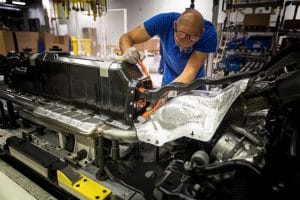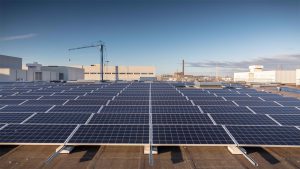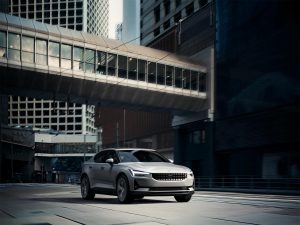Even before announcing its first-ever all-electric vehicle, Volvo has outlined a broad new plan to address its contribution to climate change, including the launch of a separate brand for battery-cars that will called “Recharge.”
In the short-term, the Swedish carmaker plans to reduce CO2 emissions and plastic waste by 25%, with the goal of becoming “carbon neutral” by 2040, said Hakan Samuelsson, Volvo Cars’ CEO.
“We are transforming our company through concrete actions, not symbolic pledges,” Samuelsson said in a statement. “So at Volvo Cars we will address what we control, which is both our operations and the tailpipe emissions of our cars. And we will address what we can influence, by calling on our suppliers and the energy sector to join us in aiming for a climate neutral future.”
The Chinese-owned automaker has been moving towards cleaner and more energy-efficient technology since early in the decade, starting with its decision to drop six- and eight-cylinder engines in favor of turbocharged, supercharged and hybridized four-cylinder engines. The most sporty powertrain in its line-up, the T8, uses all three of those technologies and is also the brand’s most fuel-efficient drivetrain.
Several years ago, the company took the next step, announcing that it would migrate to a policy in which all future products would be electrified in some form. The first of its pure battery-electric vehicles will debut on Wednesday afternoon if the form of a BEV version of the compact XC40 crossover.
(First Drive: 2020 Volvo XC60 Polestar Engineered)
It will not be the last, and future BEVs and plug-in hybrid models will be marketed as part of the Recharge sub-brand.
“The Recharge car line aims to further boost sales of Volvo Cars’ electrified cars and encourage plug-in hybrid drivers via incentives to use Pure mode as much as possible,” the automaker said in a statement, referring to the driver-adjustable “Pure” setting that switches a PHEV into all-electric mode.
Volvo is not planning on Recharge making up just a small niche. It has already indicated a goal of having BEVs alone make up 50% of its global sales by 2025. That is something it now says should yield a 50% reduction in tailpipe CO2 emissions of all Volvo products overall by 2025.
(Care by Volvo Subscription Program Faces Probe)
Generating 50% of its sales from BEVs, never mind PHEVs, might seem at first glance an overly ambitious target, especially when considering that all forms of electrified vehicles, including conventional hybrids, make up barely 5% of the global new vehicle market today. But there are reasons to believe Volvo might be able to reach, or at the least near, its goal.
The T8 is gaining a growing share of the automaker’s volume. It also helps that Volvo is a subsidiary of Chinese automaker Geely, operating two plants in that country. China has experienced explosive growth in plug-based vehicle sales over the last several years, spurred by its New Energy Vehicle, or NEV, rules. Demand has slipped since July, when consumer incentives were cut back, but Michael Dunne, a long-time Chinese auto analyst and head of consulting firm Zozo Go, told TheDetroitBureau.com that, “I think EV demand will start to rise again,” in the months ahead.
(Volvo. Geely merge development of future gas engines. Click Here to learn why.)
Meanwhile, demand is also surging in Sweden and other parts of Scandinavia, the Volvo brand’s home base. In neighboring Norway, in fact, BEVs have often accounted for more than half of new vehicle sales in recent months, at times rising to more than two-thirds of total volume.
Demand still lags in other key markets, including the U.S., but Volvo is betting it can win over consumers with new models like the coming XC40 EV, as well as another new sub-brand, Polestar. The company is now building a plug-in hybrid, the Polestar 1, and finalizing development of its all-electric Polestar 2. On Wednesday morning, the sub-brand announced plans to open a showroom in Montreal which will become its first retail partner in the Americas.





No mention of battery recycling, likely to be the next big concern.